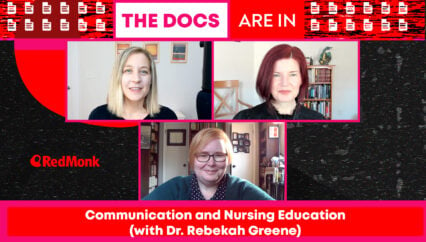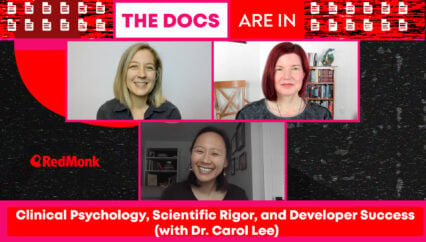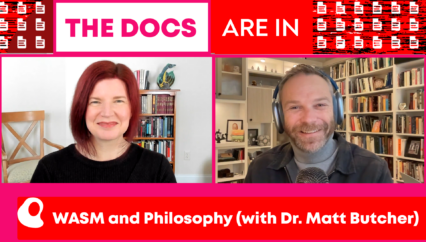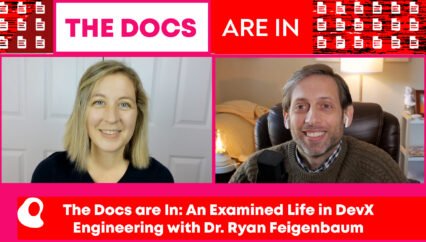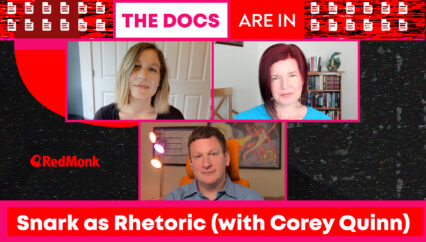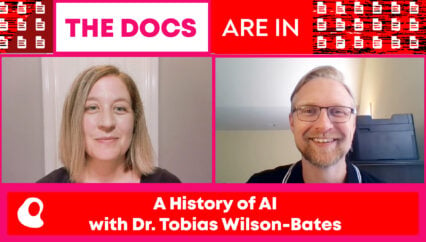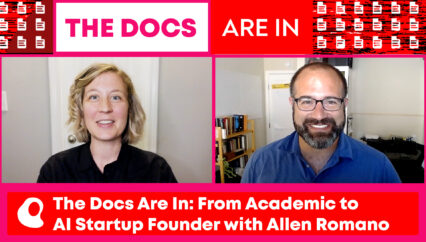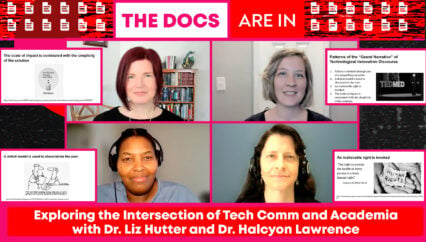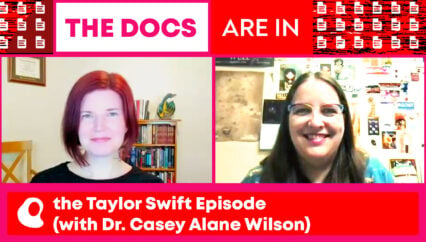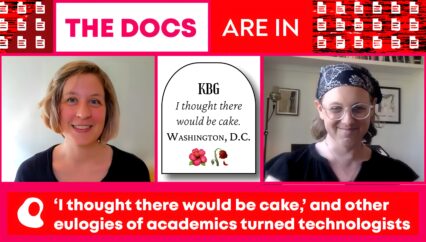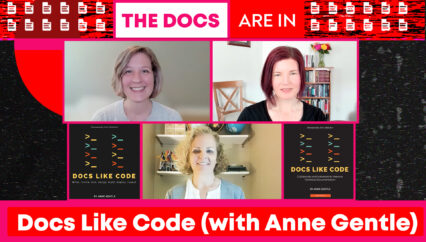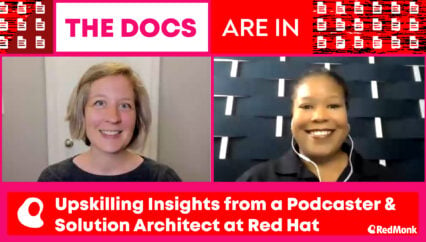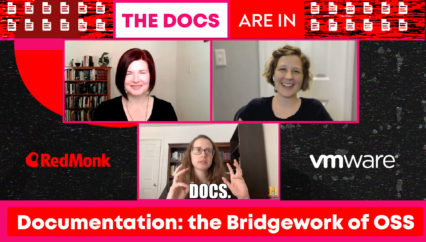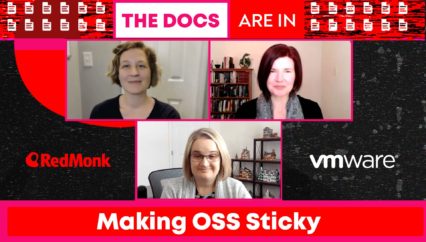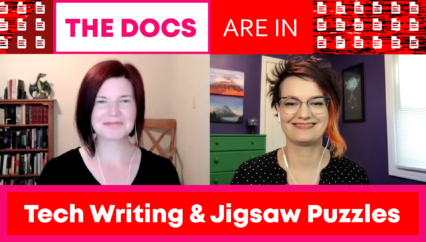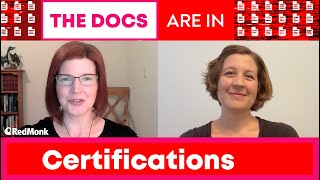In this episode of The Docs Are In, Dr. Lisa Tagliaferri (Senior Director, Developer Education, Chainguard; Adjunct Professor, Rutgers University) drops in to chat with Kate and Kelly about her experiences working at tech startups and in academia. Lisa discusses her work in Digital Humanities (or DH–where digital technologies and the humanities intersect), her research into medieval communities of learning (do we have any Catherine of Siena fans out there?), and how this all relates to open source communities. Also of interest: Lisa’s experiences with her DH graduate seminar, her work at Chainguard, and how academic training can translate to a career in tech.
This was a RedMonk video; this video was not commissioned by any entity.
Resources
- MIT Digital Humanities Lab
- Letterlocking Project
- Sigstore (a related open source tech project)
- Sigstore docs (Lisa is a maintainer)
- Cathy Davidson
- “Lyrical Mysticism” Project Website
- Historical network resources:
- Rutgers Digital Humanities graduate seminar, Spring 2022
- Chainguard Academy
- Computational Humanities, Debates in Digital Humanities, forthcoming book
- Shaping the Digital Dissertation
Rather listen to this conversation as a podcast?
Transcript
Kelly Fitzpatrick: Hello, this is Kelly Fitzpatrick with RedMonk here with my excellent RedMonk colleague, Dr. Kate Holterhoff. We’re here today with another episode of the Docs Are In. We have a lot of ground to cover today. We’ll be touching on digital humanities, communities of learning and maybe some open source communities and what that has to do with it. With us today is Lisa. Lisa, to start us off, can you tell us a little bit about who you are and what you do?
Lisa Tagliaferri: Yeah. I’m Lisa Tagliaferri. I’m Senior Director of Developer Education at Chainguard, which is a software security startup. My background is a mix of tech startups and academic work, so I completed my PhD at the City University of New York studying mostly digital humanities, medieval literature. And then I went on to do post-docs at MIT and at the Villa I Tatti, which is Harvard’s wonderful archives in the Florence area of Italy. So I’ve been working in this intersection between humanities and technology for about 15 years now.
Kelly: I’m always excited to get another medievalist on either any type of interview or on the show. And I know Kate is big into digital humanities, but I think we’re both jealous that you got to go do work in archives.
Kate Holterhoff: I know, I can’t believe that. That’s exciting. Lisa, I’m really interested in how your career path has synthesized these different threads. Would you be able to talk a little bit about how the digital humanities has informed your work at Chainguard and other startups?
Lisa: Sure. So I think… throughout my career I’ve been interested in how Humanities have been doing leadership work within the technology field. Like I think we don’t consciously think about this, that a lot of technology is Humanities Technology. So reading, writing, even spoken language itself, are all technologies. Today we think about them as being firmly within the humanities. But these are human inventions and human innovations that have, you know, we’ve passed down, we’ve improved upon through generations. So I think I take this long view of Humanities Technology. And today we have computer technology. And one project that I think is really interesting is this Letterlocking project that’s out of the — it’s actually a few different institutions. So Queen Mary and MIT are the two, I think, leading authors there. But it’s a project that uses a lot of recent computational technology and also computer imaging. So I think they use dental technology to kind of open up these letters without damaging these letters that are historical, you know, renaissance, early modern era letters. And then they use a humanities perspective to bring inquiry into that discussion. So it’s like a beautiful collaboration between technology, computational technology today and this humanistic approach that leads the way. And it’s very interesting to me, currently, since I’m working at a security startup and this technology of, you know, sealing letters, locking letters is basically the same way that we think about software, right? It’s the same kind of checks. So is this software something that has been signed? Do we know the provenance of the software? Is there a way that we can ensure that the software was not tampered with? It’s exactly the same idea, but it’s just translated to this new field.
Kelly: And that’s amazing how those like almost like two parts of your world are kind of colliding with that overlap. So we talked a little bit about Chainguard in the security space, but you are also adjuncting at Rutgers University, which is kind of near and dear to my heart because I’m from New Jersey and so many folks I went to high school with went to Rutgers, and it was a great school. Can you tell us a little bit about what you’re doing there, what you’re teaching, other stuff that might be capturing your interest while you’re in that space?
Lisa: Yeah. So I’ve been teaching a graduate seminar in digital humanities and this is through the Italian department, but it’s open to any graduate student in the humanities. So we’ve been having pretty good cohorts, maybe about 7 to 10 or so students. And for a lot of them it’s their first touch point with this kind of tech: technical or computational digital humanities where they’re learning Python or thinking about how they could leverage web servers. Of course, we talk about machine learning and AI since that’s kind of the elephant in the room in education right now. But it’s always interesting for me to kind of step back into the beginner’s mindset. And it’s something that is also relevant for my career, like thinking about the career in tech, thinking about what assumptions am I making when I’m trying to help somebody, complete a goal of theirs or get through a project or, you know, realize what it is they’re trying to do. The other thing is that I think is interesting within the humanities space is there’s a lot of discussion right now about sustainability of projects, especially when academia is going through this really difficult time where there’s changes in funding, there’s changes in tenure lines and what department is getting the resources that they need. So thinking about digital humanities projects in a sustainable way and how, if we get a seed grant of some kind, how can we maintain that? Or how can we properly archive that so that the the work is not lost and it still could be part of the bigger discourse. So that was what the focus of the last spring semester course was. So it’s really just great to think with people who are kind of just starting their careers in academia about what does sustainability look like and how can they be intentional about it.
Kelly: Yeah, I’ve said on the show that I never want to have to go back to school because I never want to have to do like, tests or writing or something and I never want anyone to have to grade my stuff. But I think I am jealous of the folks who get to take your course.
Kate: Yeah, 100% agree. Which I think kind of dovetails with a lot of the work that you’ve been doing that really synthesizes with communities of learning and how those are extensible ideas that we see both in the tech world and in academia. And so, Kathy Davidson’s spoken a fair bit about the importance of communities of learning for ensuring that education remains student centered. So can you talk a little bit about how historical communities of learning have contributed to your own ways of thinking and how this community focused philosophy feeds into supporting open source communities of learning and the larger tech ecosystem?
Lisa: Yeah. So I was fortunate enough to be able to work closely with Kathy Davidson when she moved to CUNY. So she’s currently leading the Futures initiative there, which is a great program that I feel is a great future perspective of public education, where they’re bringing community college undergraduates, the four year college undergraduates, and bringing them in direct conversation with graduate students who are teaching and kind of building these student centered communities all the way through. So I would say I’m very informed by her work. She also talks about technology, like pencils and paper, as being technology, too. So I’m a big fan, but I do think that based on my medievalist background, that I take also a very long view of this. So a lot of my work has been on Caterina da Siena, Catherine of Siena, who’s a 14th century medieval mystic, and she was working during this time when Latin was the the language of the powerful and the privileged. So a lot of knowledge was being disseminated or produced in a language that most of the people, that are out in the piazza, they’re not speaking that language at all. They’re certainly not literate in Latin. So what was going on during this period? There were lots of community workers like Catherine, like Francis of Assisi and others that were kind of tapping into this move towards vernacular learning.
Lisa: And that was, you know, we have the poets like Dante and Petrarch, but they are also people who are professionals. They’re not people who are coming from great wealth or they don’t have to work, and they could just be poets. They all have jobs of some kind, too. So they’re kind of working in this space where they’re making knowledge a little more accessible to common people. Catherine of Siena, I think is particularly interesting because we think a lot about, you know, historical male figures who are operating. We have a lot more history that’s coming from male perspective. But with Catherine, we have this lookout into these communities of women who are literate because she has her fellow women who are the Mentolate, which is a community order of the Dominican nuns. So they’re not in a common, they’re out on the street. They serve as her scribes. They’re the people who taught her how to read and write in Italian and Sianese ?Italian. And their voices are echoed through the textual tradition that we have. And I think that this model is so interesting. Like, there’s these these echoes of voices that we maybe didn’t necessarily have access to, but thinking about how people are making their own space for knowledge production outside of these other spaces of power and privilege.
Lisa: How can we learn from that? Like in terms of open source and in terms of who gets to build technology, who has access to learning technology and how can we leverage communities of learning that are peer networks that could help, you know, people kind of enter into this discourse that could enter into software development, or making the decisions about software and then can in turn serve their communities. So Catherine, she wrote in Italian, which was in service to her community in many ways, it was an intentional choice. Her confessors, the men around her, would translate viva voce to the Pope or other important people into Latin because they could not understand Italian. But it was important for her to represent her community in this way. And how can we also use this kind of idea of a vernacular technology to empower people who are maybe not invited to that discourse and to bring other voices to the fore because technology is only useful if it’s serving the people that it’s supposed to serve. So if we don’t have them participating, then it’s only going to serve a small subset of the population.
Kelly: Yeah. And as a medievalist, I didn’t specialize in Italy or Italian renaissance, but I’m very familiar with the kind of articulation of especially Dante as being this champion of the vernacular. But to your point that you have you have made in other places as well, it’s never just one person. We will like to fixate on one moment in time or one person who has made something happen. But so often other folks, especially — so Catherine of Siena, but also the communities that she’s associated with, which is not something that I knew about Catherine of Siena, even having gone through being an academically trained medievalist. So I think the parallels you’re making between something like Catherine of Siena and her communities and what she’s doing with language and open source communities for me are absolutely fascinating. I look forward to the days where you start publishing like 20 books on this topic. So one last question, and we were talking about this when we were doing a planning call for this episode, that as academics we probably should all be meeting, having a beer in a bar or something. But because we’re all in different places, that didn’t happen. But you know, more on the side of having come from that academic side of things and then lived in the tech world where everything is moving a lot faster, whereas in academia there’s often a lot of hoops to jump through for different things. How do you —
Kate: You’re putting it charitably.
Kelly: I’m really trying. But how do you have the patience to go back to academia having dealt with the much less friction-y world of tech? And also, it sounds like you’ve brought a lot of people from academia with you.
Lisa: Yes. Also, actually one of the interesting things that I’ve learned about these communities, like especially 14th century communities, is that like, how do you think about your network and how do you see how people are connected? So even that part is really interesting to me. There are quite a few and I could share them with you. We could put them in the notes, I guess. But there’s quite a few Renaissance books about networks which are really interesting and especially letter networks, because it makes material some of this that we could not readily see otherwise. But I would say thinking about this question, I think that there must be a happy medium in between startups and universities, and I’m not sure what that is because sometimes it does feel like startups are moving very fast. And, you know, since I work a lot on documentation and education for users, sometimes the product changes while you’re trying to publish; you’re learning resources about it. So that could be very fast. I do think a lot of people who are trained in academia, like in academic work as PhDs and researchers…
Lisa: I think that people who are trained this way do have a bias for action, which is very suited to the startup space. So people have a lot of ownership over their work. They have a vision. They could kind of plot work for years, right? Like with the dissertation. So I think that that could be really well suited for startups. And then at the same time, it could be very disheartening in academia where you try to publish articles and you submitted the original article before the pandemic and then you still don’t see it. And you know, it’s 2023 and you’re not even sure if you feel the same way about the article that you originally wrote. So I don’t know. I think, you know, they both have their good points. Like it is good to be able to think through something for a long time because if you don’t have that, the space for that, it could, you know — you might say things that you don’t really believe later or you might realize that you are thinking about it the wrong way. So I do appreciate some of that slow, methodical approach in academia that we are not afforded in startups where we do have to kind of act quickly.
Kate: Yeah, that resonates, I think, with a lot of what I’ve seen as well. And I won’t speak for Kelly, but this entire conversation has been therapeutic for me. So I want to thank Lisa for coming on the Docs Are In today. And with that, the docs are out.
